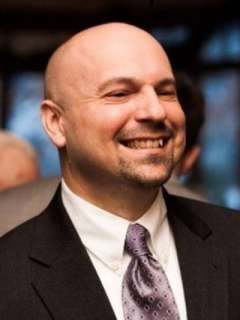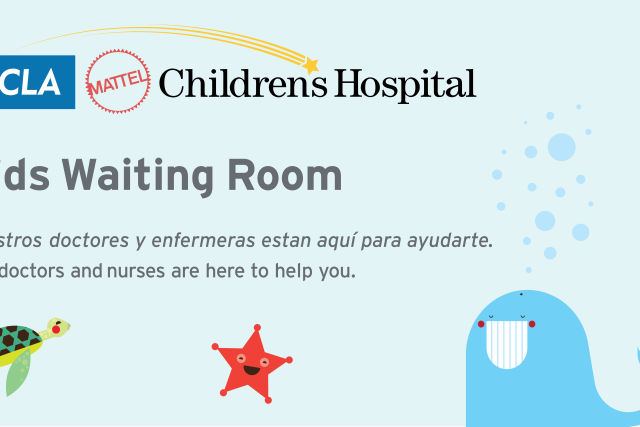When the U.S. Department of Health and Human Services announced it would open an emergency-intake site in Long Beach for unaccompanied migrant children, UCLA Health officials sprang into action.
Within 24 hours, they built a pediatric clinic, urgent-care facility and COVID-19 isolation unit inside the Long Beach Convention Center. They set up medical examination rooms, brought in X-ray machines and laboratory and pharmaceutical supplies, established secure computer networks to transmit health information and staffed the site with UCLA Health medical professionals — at least 30 at any given time, from pediatricians, family physicians and nurses to infectious-disease experts and Child Life Specialists.
“The UCLA Health system is honored to play a role in providing state-of-the-art, pediatric age-appropriate care to the children coming in on the border mission,” says Johnese Spisso, MPA, president of UCLA Health, CEO of the UCLA Hospital System and associate vice chancellor of UCLA Health Sciences. “For us, it’s a chance to really extend our care to this highly vulnerable population and support them in many ways, both for their health care needs and their psychosocial development.”

The Long Beach Convention Center site, which can accommodate as many as 1,000 children, is one of more than a dozen temporary shelters opened this year to house migrant children who have arrived in the U.S. from Central America without their parents. Ten of these emergency-intake sites are in cities throughout Texas. The first California location opened at the San Diego Convention Center in March.
The UCLA Health team learned on April 21 that the Long Beach site would open the following day. Instantly, a crew of doctors, nurses, lab workers, radiologists and more than 50 information-technology professionals raced to the convention center to begin setting up a pop-up clinic with all the services and capabilities of any other UCLA Health pediatric office.
“It was an amazing team effort,” William Dunne, administrative director for emergency preparedness, security and safety at UCLA Health, said April 27. “We’re not even a week in yet and we have a number of systems and processes down. But we're still learning every day and doing our best every day to meet the mission, and that's really to take care of these kids.”
UCLA Health has experience with both international humanitarian missions and providing local, large-scale community health services. UCLA sent medical providers and supplies to Haiti after its massive earthquake in 2010, and supplies and equipment to Lebanon after deadly explosions there in 2020. UCLA also administers health services at the annual Los Angeles Marathon and provided primary medical care for more than 7,000 athletes at the Special Olympics World Summer Games in 2015. UCLA Health also developed expertise in creating pop-up medical testing and vaccination sites during the pandemic.
The international humanitarian mission to care for migrant children in Long Beach draws on these experiences, Dunne says, as well as UCLA Health’s vast expertise in pediatric and other medical specialties.
“All that synergy comes together to create the expansive nature of our organization to pull off something like this very quickly,” he says. “In a crisis, when we pull together as a team, there aren’t too many mountains that we can’t overcome.”

About 400 children – as young as age 3 and up to 17 for girls and 12 for boys — arrived at the Long Beach Convention Center during its first week of operation. Upon arrival, health care workers screen each child for COVID-19 and other potentially urgent concerns, establish new electronic health records and issue inpatient medical wristbands like those patients receive at other UCLA Health medical centers. Any child who tests positive for COVID-19 is housed in the site’s 200-bed isolation ward.
Within 48 hours of arrival, each child undergoes a comprehensive check-up that includes a physical exam and medical history, assessment of childhood immunizations and any allergies or medications. Basic vaccinations for measles, mumps, rubella and varicella are provided.
An urgent-care facility operates 24 hours a day on site to address any acute or sudden needs. X-rays, lab tests and routine prescriptions can be handled there. Behavioral-health experts are available, and Child Life Specialists are on hand to offer comfort and support.
Buses arrive daily bringing additional children. The plan calls for them staying at the site with a goal of no longer than 14 days as officials work to reunite them with their parents, find housing with other family members or place them in long-term shelters.
For some children, this may be their first experience with such thorough medical attention.
“To identify their health care needs and set them up for success is part of all we do,” Spisso says. “It’s a core part of our mission around community engagement and serving some of the most underserved children entering the region. These children, as they enter our country and cross our borders, really have a lot of unmet needs.”
Besides medical care provided by UCLA Health, UCI Health and Children’s Hospital Orange County, the Long Beach shelter offers clothing, food, education and recreation, including indoor and outdoor playgrounds. Cheerful murals decorated with giraffes, elephants and undersea scenes, created by UCLA Health Marketing, add color and warmth to the expansive, nondescript convention center space.
The pop-up health clinic anchors the main floor, with 12 private examination rooms and an open waiting area. There are classrooms and play spaces, dining rooms and TVs throughout the space playing movies and cartoons. The children stay in small cohorts with whom they eat, learn and play.
The change in their demeanor is evident after just a few hours on site, says Dunne, who has been working at the Long Beach Convention Center since plans for emergency intake were confirmed.
“You see the stress reduced and more of a calmness in these children, that they feel supported and cared for and in a safe place,” he says. “Being able to see the looks on their faces is really important for our team as well.
“It's hard on the front end,” he says. “It's heartbreaking to see some of these kids. But I think when everybody goes home and looks in the mirror that night, they have tremendous pride in what they're doing.”
Many of the nurses, physicians and other UCLA Health specialists are working at the Long Beach site in addition to their regular shifts. The program is funded through Health and Human Services.
“I am so pleased to see the incredible response from our staff. I’m just so inspired by their willingness to serve these children,” Spisso says. “This is really extending our walls beyond our hospitals and clinics and going into this remote site in Long Beach to provide world-class care in what looks like just a pop-up UCLA Health clinic. It has all of the types of services that we provide in any of our other clinics, and it’s on site 24/7 to meet the unique needs of pediatric patients.”
Learn more about the Humanitarian Care for Unaccompanied Children.
Related articles
An emergency intake site for migrant children is built in 24 hours
UCLA Health Child Life Specialists bring warmth, support, to migrant children in Long Beach



